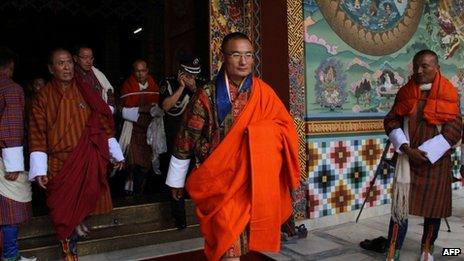Bhutan PM casts doubts over Gross National Happiness
- Published

Mr Torbay says that Bhutan faces pressing problems
New Bhutanese PM Tshering Tobgay has cast doubt on the country's pursuit of Gross National Happiness (GNH).
The concept is overused and masks problems with corruption and low standards of living, Mr Tobgay told AFP news agency.
GNH aims to measure quality of life in more complete terms than gross national product (GNP), striking a balance between the spiritual and material.
The term was coined in 1972 by Bhutan's former King Jigme Singye Wangchuck.
It has been at the heart of government policy since then, although recently some critics have taken to referring to GNH as "Government Needs Help".
Mr Tobgay was elected in July after his PDP party won 32 of the country's 47 parliamentary seats.
He has projected himself as a reformer, rejecting the trappings of power including an official limousine and luxurious prime ministerial accommodation.
'Distraction'
Mr Tobgay, 47, said that while he supported the notion that "economic growth is not the be-all and end-all of development", GNH should not distract from tackling Bhutan's pressing problems, including chronic unemployment, poverty and corruption.
"If the government of the day were to spend a disproportionate amount of time talking about GNH rather than delivering basic services, then it is a distraction," he said.
"There are four issues that can compound to make matters extremely bleak: our ballooning debt that if we're not careful will not be sustainable; the big rupee shortage; unemployment, in particular youth unemployment; and a perception of growing corruption.
"These four combined can make a lethal combination."
- Published13 July 2013